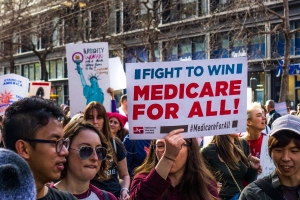Producers
When talking about Health Flexible Spending Accounts (FSAs), you may hear the terms carryover, grace period and run-out period, but what do they mean and how do they differ? Here are some simple explanations of each term.
In the continued war for talent, employers increasingly rely on benefits to help differentiate their organization and attract and retain better employees. Brokers have long played a critical role in this battle, helping employers build a better benefits package. But in today’s fast-changing workplace, a broker’s expertise on the multiple challenges their clients face is just as important as knowledge of the complicated benefits market.
Over the years, HSAs have been touted as a way to pay for out-of-pocket medical expenses with tax-free dollars. However, recently HSAs have been making headlines as an alternative to 401(k) plans and other retirement plans.
The term “Medicare for All” has been making headlines recently. Democrats across the country have made this concept a central part of their platforms, and polls have shown that more than half of Americans are in favor of it.
But what does it really mean? Well, the best answer is that it means different things to different people.
Annual Medicare Part D reporting is required for all employers who provide health benefits with prescription drug coverage. The reporting is an online filing to the Centers for Medicare & Medicaid Services(CMS), and it lets CMS know if the prescription drug coverage available on the employer’s health plan is “creditable.”
A stand-out strategy for small businesses: Voluntary benefits enable small companies to do more with less
The competition for talent is fierce for small businesses. One in four say the talent pool for their open positions is poor, [1] and the Society for Human Resource Management lists retaining employees as one of the top three issues facing companies with 3-99 employees (along with employee productivity and controlling health insurance costs).[2]
Agency officials were busy last week releasing updated forms and publications while also proposing new rules that would generally impact health plans in 2020. Here are three important releases which are now available:
The Employee Retirement Income Security Act of 1974 (ERISA) requires employers to provide a Summary Plan Description (SPD) to employees if they offer health, dental, vision, life, disability or other benefits.
This does not apply to all employers. Please read full article below for details.
2018 ACA Reporting Deadlines are Approaching
It’s that time of year where applicable large employers (ALEs) and certain other employers need to focus on completing their reporting obligations required under the Affordable Care Act (ACA). Here are some helpful tips and reminders.
Using a debit card just got a whole lot easier!
Benefits Buzz
Enter Your Email









